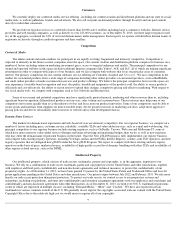Enom 2013 Annual Report Download - page 21
Download and view the complete annual report
Please find page 21 of the 2013 Enom annual report below. You can navigate through the pages in the report by either clicking on the pages listed below, or by using the keyword search tool below to find specific information within the annual report.
Risks Relating to our Domain Name Business
We have applied to become a registry operator for new gTLDs pursuant to ICANN’s application submission and approval process. We may
not be successful in acquiring the right to operate some of the new gTLDs for which we have applied, and therefore may not be able to grow
our business as rapidly as we have planned and may lose some of our investments made in connection with the New gTLD Program.
We have applied through ICANN’s New gTLD Program to operate registries for a number of new gTLDs on a stand-
alone basis. We have
also acquired rights to certain gTLDs, and intend to acquire rights in additional gTLDs, based on our strategic relationship with Donuts, a third-
party new gTLD applicant. During the years ended December 31, 2013 and 2012, we invested $ 3.9 million and $18.2 million, respectively, for
certain gTLD applications under the New gTLD Program, and we may choose to invest significant additional funds in this new, complex and
untested process.
We are in competition with other third-party applicants for many of the new gTLDs for which we have applied or in which we have rights
through our agreement with Donuts. There are multiple steps in the ICANN approval process. When more than one party applies for a gTLD, the
parties are typically required to enter into negotiations or partici pate in an auction to win the registry rights. We may be outbid or otherwise
unsuccessful in acquiring gTLDs in these negotiations or auctions. In addition, other applicants and third parties have filed objections against
several of our gTLD applications. The arbitration panels that ICANN has established to resolve these objections are unpredictable and have ruled
against certain of our applications. If we lose an objection, we will either lose the right to the application for the gTLD registry or be forced into
private negotiations or auctions. We could also face lawsuits or other opposition to our gTLD applications or any award of gTLD operator rights.
If we are unsuccessful in being delegated an adequate number of new gTLDs, we may have a lower than expected return on our
investment, and our future growth, financial condition and results of operations would be adversely affected.
ICANN
’s New gTLD Program may be modified, limited or delayed in unforeseen ways that could adversely affect our business.
There have been and continue to be numerous and substantial delays in the New gTLD Program. The New gTLD Program may be subject
to additional delays, and may not proceed as anticipated. ICANN is subject to many influences, both internally and externally, incl uding
existing registries, new gTLD applicants, registrars, national governments, law enforcement agencies and trade associations. ICANN may be
exposed to potential legal challenges from new gTLD applicants as well as entities opposed to the introduction of new gTLDs, which could
cause delays in the process. In addition, the introduction of a large number of new gTLDs poses technical challenges for ICANN, and opposition
to new gTLDs could build if ICANN mismanages these technical challenges. Any delays in the New gTLD Program may impact the timing of
revenue associated with our gTLD registry initiative, and therefore adversely affect our margins and results of operations.
As a new gTLD registry, we are subject to ICANN
’
s registry operator agreement and governing policies, which may change to our detriment.
A registry operator agreement with ICANN (each, a “New gTLD Registry Agreement”) is required for each new gTLD registry that we
operate. To date, we have 21 New gTLD Registry Agreements. Eleven of the gTLDs for which we have New gTLD Registry Agreements have
been delegated to us and inserted into the authoritative database for the Internet, known as the “Root Zone.”
We face risks arising from our New gTLD Registry Agreements with ICANN, including the following:
19
1
ICANN could adopt or promote policies, procedures or programs that in each case are inconsistent with our current or future plans, or
that affect our competitive position. For example, each of the New gTLD Registry Agreements contains guidelines for the operation
of vertically integrated enterprises operating both a registrar and a registry. If ICANN were to materially change those guidelines or
prohibit such vertical integration, such a change would have a material adverse effect on our future growth, business and results of
operations;
1
under certain circumstances, ICANN could terminate one or more of our New gTLD Registry Agreements; and
1
ICANN has the right to increase the fees due from the registry operator under the New gTLD Registry Agreement. The increase in
these fees with respect to any gTLDs for which we act as the registry either must be included in the prices we charge to registrars or
absorbed by us. If we absorb such cost increases or if increased prices to registrars act as a deterrent to registration, we may find that
our profits are adversely impacted by these increased fees.
























